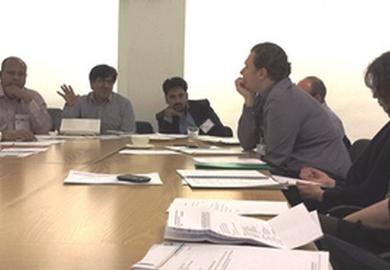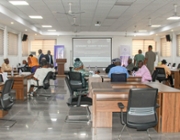Pakistan LGAs learn about leadership and advocacy

06 May 2014
Local government association representatives from Pakistan’s four provinces met in London from 5-9 May to learn about aspects of leadership, public affairs, and supporting members from their peers at the Local Government Association of England and Wales (LGA). CLGF has been following developments in Pakistan since responsibility for local government transferred to the four provinces and has been encouraging the states to hold elections for local government to ensure that local representatives are democratically elected. The representatives – from Balochistan, Khyber Pakhtunkhwa (KPK), Punjab and Sindh provinces met in London for the four-day training programme on strengthening the advocacy capacity of local government associations in Pakistan as part of CLGF’s South Asia programme. The programme is funded by the UK Department for International Development (DFID).
The four provinces have different approaches to restoring elected local government. Balochistan is the only province to have held local elections so far. Cllr Abid Hussain, recently elected as a councillor for Quetta City, said that in Balochistan the first stage of elections had taken place for 58 union councils and Quetta City. On 29 May there will be further elections for special seats such as those reserved for women.
Yousaf Aub Khan, President of the Local Councils Association of KPK, described the recent developments in his province including new legislation which not only sets up a new three-tiered local council system but also ensures that finances back up the transfer of powers, with a commitment to 30 per cent of the state budget being earmarked for local government. The new law provides for three tiers of council: village (rural) and neighbourhood (urban) councils; tazil/city councils; and district councils. Each village council will contest five general seats, and five reserved – two four women, one for farmers/industrial, one for minorities and one for youth. Multi-party elections will take place later in the year once there has been time to establish an electronic biometric voting system. Mr Khan, who has been involved in the development of policy and legislation said that his participation in a number of CLGF’s meetings and CLGF’s support had greatly assisted him in helping shape the new law.
Both Punjab and Sindh are on the road to local elections but still have some hurdles to overcome. Following the training, CLGF will be discussing further support for the local council associations and newly elected councillors and the setting up of a national local government association. To date CLGF has undertaken two missions to Pakistan, one coinciding with a UNDP-organised development partners’ event on decentralisation in Islamabad, another primarily to Quetta, Baluchistan, to discuss post-election support for local government in the province. The latter mission also involved interaction with both federal and the Sindh provincial governments; it identified the possibility of providing support to the region of Gilit-Balistan. CLGF is now looking at developing a more extensive assistance programme to support implementation of the Aberdeen principles with initial focus on Baluchistan. CLGF’s work has placed particular importance on giving support to its member, the Local Councils Association of Punjab (LCAP), and other LGAs in Pakistan.
Back to News





